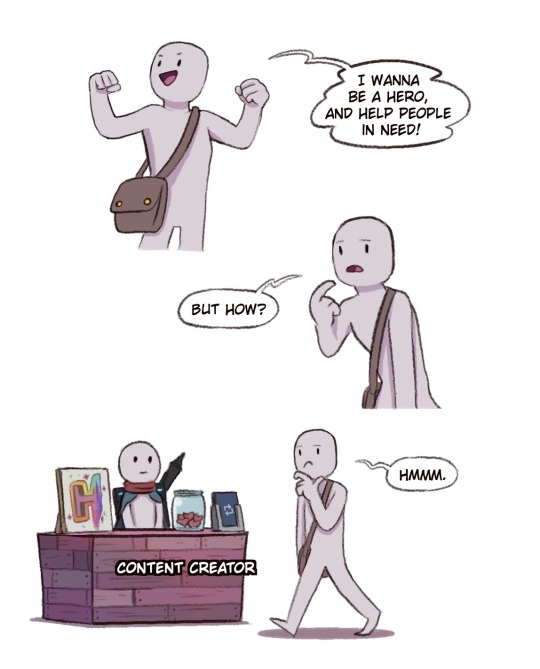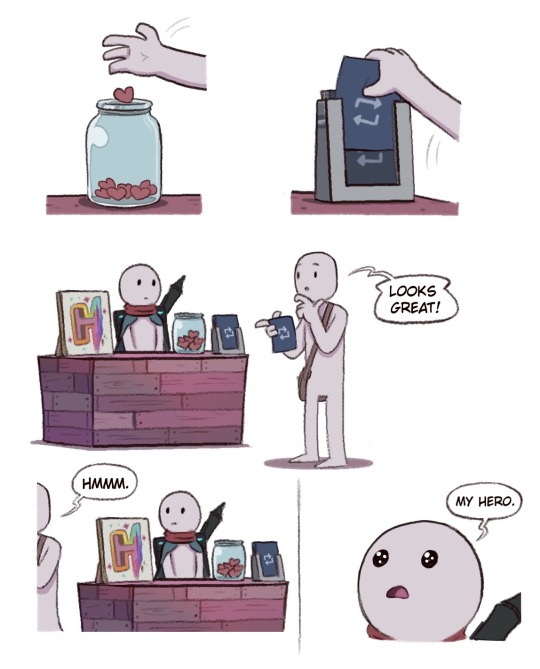Don't wanna be here? Send us removal request.
Text
1. I am blind to social cues. 2. Social cues exist from handshakes and high-fives to love languages and apologies. 3. This is potentially trauma-based but could be a symptom of autism. 4. Because of my blindness to social cues, I don’t hold others to them, and so get along with others that also are blind to them. 5. Because I don’t uphold and/or break social cues I am blind to, I may come off as unapproachable, uncaring, ungrateful, mean, etc to people, even if they are not aware the reason for it is me breaking or not upholding a social contract.
And this is life-changing for me.
1. I am blind to social cues.
I was today years old when I realized that certain words and phrases are part of the social contract. This is due to one aspect of me not picking up on social cues. Despite my blindness to them, there are some that are ingrained within me. There are also others that I am not blind to.
2. Social cues exist from handshakes and high-fives to love languages and apologies. And monogamy.
Imagine, for a moment, that you reach out for a handshake, and the other person doesn’t accept. Would you be offended? Would you feel hurt? Now let’s say instead you reach out for a handshake and they instead pull you in for a hug. Depending on the person, this may come off as being too casual, creepy, or a warm and intimate moment. (I am not pro-pulling people into hugs, as that may not have consent. But that’s a whole other topic.) These two examples highlight either Not Upholding the social contract or Breaking the social contract.
Phrases like “Thank you,” “I love you,” and “I’m sorry”, as well as their responses of “You’re welcome,” “I love you, too,” or “I forgive you” are all part of the social contract, as well as many others. Because of this, some people need to hear the specific words or they can feel offended, etc, as above. Not saying the specific words can be Not Upholding and/or Breaking the social contract. (Similarly, certain words have a context that, when not taken into account, can mean a social contract is not being met).
Because of either Not Upholding or Breaking the social contract, the immediate impact may just be a feeling, whether positive or negative. Over time, that feeling is likely to grow as more social contracts are not met. People may not even be able to put their finger on why they feel a certain way, as they may not be aware of their own expectations (social contracts) they are holding people to. If you find someone frustrating, upsetting, etc, it is likely because you have a social contract that you may not be aware of that they are Not Upholding or Breaking.
These “social contracts” run DEEP, and thus may not be easily identified. If someone runs late, we see it as disrespectful or irresponsible because there is an expectation (aka social contract) to be on time. Love languages are all about expectations for showing affection/appreciation, and they’re things like quality time, acts of service, words of affirmation, and other expectations (aka social cues) we hold. The concept of “patience” is that people don’t get upset despite upsetting things, but the “upsetting things” is ALSO a social contract. People being “too slow” in the fast lane, people being “too loud” or “obnoxious”, etc. Maintaining your composure despite stress is something we value (and is an expectation or social contract), but we call it patience. And so it goes full circle and we may end up calling people patient because they may not hold people to the same social cues we do.
People’s social contracts (patience, charity, kindness), what they find polite, respectful, “right”, moral, etc, make up their values. And everyone has a different set. It’s why we have Democrats and Republicans. There is something that the people in the political parties either see being Not Upheld or Broken by one side, and it is important enough to take sides for.
3. This is potentially trauma-based but could be a symptom of autism.
In psychological terms, punishment is something that makes a behavior less likely, and reward is something that makes it more likely. In my house, sometimes “punishment” included saying certain words and phrases, such as “thank you”, “I’m sorry”, etc. While it was an unintentional impact of these phrases being (again, in psychological terms) punishment, it did steer me away from them and make using them less likely, instead of more likely. This may have been an early shift (me giving an apology, rather than saying the specific words, “I’m sorry”), and may have even been rewarded (they accept the apology without the words “I’m sorry”).
I did this shift in phrasing unintentionally, though working customer service has likely had an impact. It is amazing how much customer service training boils down to “be polite” which itself boils down to “follow these social contracts”, but it’s put in much grander terms.
4. Because of my blindness to social cues, there are many I don’t expect to see upheld, and so get along with others that also are blind to them.
This may include people on the autism spectrum (there’s one little one that has a special place in my heart), people that also have such learned traumas, and more.
5. Because I don’t uphold and/or break social cues I am blind to, I may come off as unapproachable, uncaring, ungrateful, mean, etc to people, even if they are not aware the reason for it is me Breaking or Not Upholding a social contract they have.
However, people that are NOT blind to social cues may be impacted by my failure to meet their expectations, even if they don’t realize they have those expectations. In so doing, they may have a harder time getting along with me (or me them), and it results in problems in the relationship, either early on (“first impressions last”) or later down the road (which may include “growing apart” by Not Upholding the social cue of staying in contact).
And this is life-changing for me.
I can adjust my behaviors to better align with social contracts. For instance, instead of saying “I really appreciate you doing this for me,” I can instead say “I really appreciate you doing this for me, thank you.” Whether the person has the “thank you” social contract or not, I would be upholding it.
I can also, because of my blindness to even the social cues I hold others to, ask myself when I have strong feelings about something, “what were your expectations for them?” This will help me identify them and either adjust my expectations or communicate them.
0 notes
Text
Taste the Soup
I’d like to share two stories. Compare how they relate and how they’re different, and why people like one but another falls flat. I was thinking about the first last night and it felt very resonant.
Story #1, possibly best known from end of Coming To America.
Guy goes into a restaurant, orders soup. Soup’s delivered. After awhile, he signals the waiter. The waiter says “sir, is there a problem with the soup?”
The man says, “taste the soup.”
“Is it too hot?”
“Taste the soup.”
“is it too cold?”
“tASTE the soup.”
“Is it too spicy?”
“Taste the soup.”
“Is it too bland?”
“Taste the soup.”
Finally, the waiter, now exasperated, says “okay.” He goes down to taste the soup, and says “there’s no spoon.”
The man: “A-HA!”
As a joke, it isn’t great. The non-waiter character comes off as a demanding jerk, making things difficult and leading the waiter to the answer that could have been given. The humor of it seems to be based off of the waiter “catching up” to the actual problem.
Story #2, from Twitter
I work with a guy from Mexico who doesn't speak a lot of English. A Canadian goose made a nest by one of the paddock gates and hissed at him while he was putting horses out. He comes back to us after and says, "I do not like the cobra chicken."
This story gets a lot more chuckles, in my experience, and gained a lot of traction as a somewhat endearing term for the geese (much like snakes be “danger noodles” or raccoons being “trash pandas”). This is a success story about communicating when language fails, but words can be used in innovative (and fun) ways.
———
The difference between the two stories is mostly the perspective, it seems. The second story clarifies that the person doesn’t know a lot of English. It becomes a story that celebrates finding a way to communicate regardless of that barrier. In the other, the waiter seems to be the butt of a joke, and the characters are at odds.
But what if the first story was presented more like the second, without changing any major details? The first story could be about someone that similarly doesn’t know much English, perhaps doesn’t know the word for spoon, but is doing their best to communicate. So they just repeat what they can, and the “A-Ha!” is them being happy the waiter understands. Or what if the customer was deaf, and had ordered by pointing on the menu, and they were using sign language to ask for a spoon, but the waiter wasn’t understanding because they didn’t know sign language (interestingly enough, the sign for “soup” is just the sign for “spoon” going all the way to one’s mouth).Or if the waiter was deaf and the customer was trying to sign that they needed a spoon, was instead signing soup? (I don’t think it would be likely, as most people I’ve known that have hearing impairments do well at reading lips). It seems like a much better story, and the details even make it seem like the joke may have started off that way (with the customer being deaf, not difficult).
Why dig this far into a bad joke?
Sometimes I think I come off as the customer in the first story. I try communicating something, but do not do it well. I’m not trying to be difficult or rude, but I struggle at times to choose words to properly convey things. My family has told me a number of times that I’m not good at telling stories, and while many other people disagree, I think some of it is either not emphasizing certain elements enough or emphasizing too many things. The spoon is part of “tasting the soup”, but if the customer had just broken it down to just “spoon” rather than a process, the message would have been received more readily.
My thoughts kept me up a bit last night thinking about this. And today I was told I’d be getting my annual review at work (and then did a few hours later). Sometimes I put out too much information, and that makes it harder to know what the focus is. Sometimes I leave out details, whether because I take them for granted or don’t realize I failed to say something I should have. People say I’m condescending, and it’s something I’ve heard a lot, but it isn’t me trying to “square up” on someone’s vocabulary, it’s me trying to use the words that make sense.
0 notes
Text
I was dreaming when I wrote this, forgive me if it goes astray
It’s about 4AM on September 11th, and my head is full of lessons that life taught me that I wish I had learned sooner.
People often say “ignorance is bliss”, but I think that is too broad an idea to cut it down in such a way. In my experience, ignorance is a privilege. And more importantly, ignorance is a privilege that many cannot afford.
For brevity’s sake, as I may have already lost some readers, I do want to be clear that “ignorance” in this context can either mean incidental, such as naïveté, or a more willful ignorance, such as gaslighting.
We’ll focus on two main examples of the existence of ignorance. The first is racism, and the second is lack of communication about the experiences of others.
Being “Othered”
My birthday is September 11th, and on that day in 2001, many peoples’ eyes were opened to possibilities they had not considered. Americans saw that we could be attacked and that civilians on American soil may be harmed as a result. People across the world also saw it, and wondered if there would be war, who it would involve, who it would impact, etc. There were some Americans that lived through Pearl Harbor, but there were decades of Americans that hadn’t really faced the concept of American being attacked.
People wanted someone to blame. People wanted their worldview to be unchanged. People wanted some way to feel the world still made sense. So some blamed certain groups, whether they were external enemies or conspiracies of people in power. And when people blame enemies, they tend to define those enemies in a way that makes them feel safe, secure, and on the side of good. “They” are the group that can’t be trusted, must be held accountable, have a different and bad view of the world, but “us” includes ourselves and our friends, because we’re all good people and would surely never do such an atrocious thing.
After Pearl Harbor, it was the Japanese. After 9-11, it was Middle Easterners. During COVID, it was Asians. Even the Spanish Flu is named in a way to blame someone else, despite evidence of possible guilt on “us”. But that concept of “Us” means being part of one group until one’s membership is questioned. The concept of “passing” is something many minorities become aware of early, but for myself it didn’t happen until I was about 15, and after the events of 9-11. I was minding my own business browsing a mall when a random stranger came up to me and simply asked, “Are you Jewish?” And in that moment, despite the concept of “passing” never having been discussed with me, despite thinking of myself as a white person my whole life before that, despite being in a crowded mall with plenty of people around me, I felt “othered” for the first time. It wasn’t that I was being bullied and singled out, it was that my identity was questioned, that what side I was on was suddenly important, that all the random passersby just went from being part of “us” to maybe seeing me as a “them”. And my blood ran cold because of it. Again, for the sake of conciseness and honoring a heritage I was not raised in, I was born Jewish but not raised as such. And I answered the question, “I am.” And as simple as that, he laughed, went back to his friends, and said “See? I told you we can pick each other out!”
That day, I lost some of my ignorance. Some of my naïveté. That was about twenty years ago and I am still learning some lessons like it, so it didn’t “cure” my ignorance, but did open a significant door to understanding the lives of people that couldn’t afford the ignorance I have. People that weren’t as passing as I was, whether due to race, perceived gender, or other reasons. If I was black, I would not have made it to 15 before feeling “othered” and a minority. My ignorance was a privilege.
The Experience of Others
Now, despite the seriousness of both topics, this next one is a bit more lighthearted. Perhaps in part because of lower gravity. In 1983, Sally Ride became the first American woman in space. It wasn’t until 1972, with the passing of the Equal Employment Opportunity Act that qualifications of women would even be reviewed for potential space flight, in part because astronauts were chosen from the ranks of fighter pilots (the first female fighter pilot in the US Air Force was Jeannie Marie Leavitt in 1993). Because NASA had previously only dealt with male astronauts, many presumptions had to be questioned, and adjustments made. Even on the ground, a women’s locker room was made. For the lack of gravity in space, urine-catching devices had been used that were similar to condoms, and so needed to be updated. But NASA’s ignorance is best summarized when they asked Sally Ride, regarding her scheduled one-week mission and how many tampons to pack, “Is 100 the right number?” She responded “That would not be the right number.”
NASA, at the time, was not even 30 years old. Though they had history, people could still remember the beginning of it and many decisions made along the way. NASA had made many presumptions early on that they later needed to face and overcome the challenges of. They had to review systems, see what didn’t leave space for women, such as the locker rooms, and also question the validity of the solutions that they had assumed would be for men and how those may not work for women, such as the urine-catching devices. Despite only being thirty years old, many facets were found that updates were necessary for.
America is much older than NASA was when it began to accommodate women. Instead of decades of history of and decisions without thought to the potential of women astronauts, America has centuries of minorities that were not only not given opportunities but also faced hostility and oppression, as well as lack of consideration. And that goes back even beyond the Revolutionary War, back to the original crew that went with Columbus, taking land from the inhabitants and forcing their system of laws, contacts, and deals upon those they were invading the lands of. There were many decisions made along the way, many advances in technology, communication, medicine, and so some of the ignorance and hostility is deeply rooted. Early Americans never planned for elevator access for the disabled, they had outhouses instead of planning indoor plumbing arrangements for gender-specific restrooms, even in more modern days there are some places that have changing tables in women’s restrooms but not the men’s based on assumptions of responsibility regarding child-rearing. Simply living with things as they are because of long-standing assumptions is not acceptable, and despite many of those decisions, rules, and expectations predating us and being lost to time, we are reminding people that are seen as “Other” when the system does not account for them.
iPhone came out with Face ID technology… and some people found that their features were similar enough to others of their race that they could bypass Face ID as security. Twitter used an algorithm to determine how to make photos into thumbnails… and so it focused on light shades for faces, overlooking people with darker skin tones.
Take a moment to think of where you spend your time. Your home, your work, perhaps at school or even visiting a friend’s home. If you had to use a wheelchair, how much would that affect your ability to enjoy those places and the people you see? How many small apartment buildings do not have elevators. Would you be willing to have someone carry you if no other option was present, and would someone be available to assist you in that way? What if your wheelchair couldn’t fold and was too wide for some door frames? Even something as simple as a lip or step in a door frame could become a major obstacle, and may eventually wear people down to thinking that it simply isn’t worth the attempt. And yet others live their entire lives with these challenges, many of those differently-abled may not be immediately identified as such, and even those that are rely on systems that may not be built with considerations for them.
An estimated 40,000 Americans have lost part of their arm above the wrist and 500,000 have lost at least one finger, and that doesn’t account for other hand deformities. Computers and the internet have become a major part of life in the world, and schools are likely to include typing classes. But how do they include or account for those students who may not have the assumed ten fingers? What about the mechanics we use for touchscreens, such as “pinching” a map to zoom out? Perhaps this is the first time you’ve wondered about it, though maybe not. And some may say that typing classes cannot account for every potential hand shape or major difference. There is some truth to that, but even Steven Hawking, when unable to use his hands, was able to find assistive technology so that he could still type.
Ignorance is a Privilege that many cannot afford.
Not having to face experiences that are uncomfortable is a privilege. Being able to live day to day and not think about how history has created challenges that society has not seen fit to deal with is a privilege. Not wondering about if blind people turn on their lights at night, or how deaf people know when someone knocks on their door is often because someone’s life has never had cause to question these experiences. And that’s okay. None of us were born into this world knowing about everything. For every experience we’ve had, there had to be a first time. But I’d like to think that society can do better about introducing the question to the population, to let people wonder what they have come to assume is “normal” and how others may not experience that.
I started this thinking that it would maybe be a TikTok, just lessons life taught me that I didn’t learn in public school classes. Lessons that would have helped me to be a better person sooner in life. Lessons I hope that someday, when the time is right, I can help my daughter understand the importance of. And yes, they are rather big lessons and topics, perhaps not meant to be bite-sized. Still, even if it’s hard to swallow, perhaps I can make it just a little more convenient to try wrapping someone’s mind around.
2 notes
·
View notes
Text
Patriarchy
I could have been radicalized when I was younger. I kept to myself, was raised in a cult, didn’t know enough about the experiences of those outside my bubble. I hung out in chat rooms, played video games… I was the target audience for it. But, thankfully, I found the right influences when I needed to.
With the new generations now having Roe v. Wade get overturned, the idea of “sitting on the fence” on certain issues becomes a political stance. Sitting atop the Berlin Wall isn’t a neutral stance.
“Patriarchy” isn’t a centralized focus to give more power to men, it’s an often unconscious series of decisions that lead to men having the “right of way” in society. These can be from micro aggressions (asking a woman you just met how many children she has, if you wouldn’t ask a man that) to full-on misogyny.
Because anecdotes are harder to use as evidence of trends, I’ve collected the following examples of the patriarchy at work. Of times that men have a privilege that women do not.
1. A 30-yr old man had sex with a 16-yr old, and later got full custody of the child. The article calls this an “alleged rape”. This is in Louisiana, where the age of consent is 17. Legally, she could not consent, even if she wanted to, even if she was literally begging for it, it would still be rape. And yet they call it “alleged rape”.
https://nypost.com/2022/06/22/judge-temporarily-reverses-child-custody-decision-for-dad-accused-of-raping-teen-mom/amp/
2. Though these stories talk about the rape kit backlog, it shows there was systemic lack of effort regarding investigating allegations of rape, even when evidence was readily available. The first article is from Michigan, the second from California, published just earlier today, showing that it’s taken about 20 years to catch up on these. One of the things found by investigating these was serial rapists. Imagine doing everything right, not drinking, staying with others, but being overpowered and violated. You trust the system will take care of you, so you go to a hospital so they can collect the evidence… and it’s the 1980s. Twenty years later you find out about the backlog. That a night that you may still have nightmares about has been sitting on a shelf.
If we don’t make justice for those that are wronged a priority, then we are not making those people a priority.
https://wdet.org/2021/09/13/evidence-from-massive-rape-kit-backlog-yields-more-than-200-convictions-lasting-policy-changes/
https://www.ocregister.com/2022/06/28/orange-county-clears-30-year-backog-of-testing-sexual-assault-kits/amp/
3. The Brock Turner Case took the spotlight for a while. He had sex with an unconscious woman, was caught in the act, and two others held him until police arrived. Despite having two witnesses to the act, plus the police reports and victim testimony, Brock was sentenced to 6 months… and served three. And yes, new laws were created, the judge was recalled years later, but these shifts would not have happened were it not for the public outcry due to the attention the case got.
https://en.m.wikipedia.org/wiki/People_v._Turner
4. There are examples of people being charged with manslaughter due to unsuccessful pregnancies. Miscarriages impact about 25% of pregnancies, and even if the child is born healthy, the mother could be charged with neglect if they used drugs during the pregnancy, even medical marijuana. As a felony, this could result in a life sentence.
https://www.normantranscript.com/news/woman-charged-with-manslaughter-after-miscarriage/article_5b26622e-7724-11ec-a014-53d51ad180a0.amp.html
5. Piggybacking off the policing of pregnant bodies, miscarriages and unknown pregnancies. The first article estimates that about 50% of pregnancies end in miscarriage, though reported numbers tend to range between 20-25%. This discrepancy may be due to women not knowing that they’re having a miscarriage, or perhaps we’re even pregnant.
The second article states that 1 in 2500 pregnancies get all the way to labor before they know they’re pregnant. It may not sound like many, but with over 3.6 million US births last year, that’s about 1.5K people finding out last minute, and potentially not having made any lifestyle changes.
https://ovumhospitals.com/blog/can-woman-miscarriage-without-knowing/
https://www.webmd.com/baby/features/can-you-be-pregnant-not-know-it
6. Ignorance about conception also causes some of the decisions regarding legality of issues and their handling. Again, there may not be any malicious intent, but if effort is not given to passing the mic, to learning what misunderstandings exist and combatting them, the patriarchy can live on.
https://amp.theguardian.com/world/2012/aug/19/republican-todd-akin-rape-pregnancy “The female body has ways to try and shut that whole thing down.” - Todd Akin, 2012
“the juices don’t flow, the body functions don’t work, and they don’t get pregnant.” - Henry Aldridge, 1995
Clyde Chambliss, 2019, was asked if victims of incest would be able to get an abortion due to a 20-week ban and responded, “Yes, until she knows she’s pregnant.” On the same topic, terminating fertilized eggs in a clinic is okay because "The egg in the lab doesn’t apply. It’s not in a woman. She’s not pregnant." …so it’s not about conception, it’s about the pregnant individual.
“I think even when life begins in that horrible situation of rape, that it is something that God intended to happen.” - Richard Mourdock, 2012.
Yesli Vega, mother of two children, also seemed to believe rape was unlikely to result in pregnancy because it doesn’t happen “organically” and because the rapist does it “quickly”. - audio released just this week
———
One last set of examples, these showing how society creates situations in which it is up to the woman to not be a problem for men, rather than men being responsible for their own actions. They’re from schools, a branch of government and a part of society that most people experience.
Dress codes: https://19thnews.org/2022/01/school-dress-code-challenges/?amp
No right to say no: https://www.reddit.com/r/exmormon/comments/fbh1ae/utah_middle_school_girls_cant_say_no_when_asked/
Punished for self-defense: (this one I use Snopes for, because the story hasn’t been confirmed, but does shine a light on how society takes certain forms of sexual assault) https://www.snopes.com/fact-check/bra-twang-punch/
———
In the end, the patriarchy is a force, not a conspiracy or plan. It’s a few footsteps through a wooded area, that others follow, and traffic diverts until a path is made. Many of those that end up supporting the patriarchy don’t do it out of maliciousness or a clear decision, but because they’re doing what they’ve been conditioned to. They do it because they don’t see that they can end a cycle, or the consequences of it.
It cannot be ended without awareness and effort to far-reaching effects.
8 notes
·
View notes
Text
There should be an easy to acquire and review list of “Weirdest Scientific/Mathematic Terms/Ideas” or something. Maybe a calendar that does a random one each day.
I’ve been asked before what my favorite Theory is (yeah, I have weird friends, but it doesn’t get boring), and I told them about the Hairy Ball Theorem. Which basically says that you can comb the hair on a donut to all face the same direction, but you can’t on a basketball… yeah, real thing. I found out yesterday (I was yesterday years old(?) ) about the Meissner effect, and I’m pretty sure I can use that for a supervillain’s plan eventually. Russell’s Teapot is more about philosophy or I suppose law than science/math, but still pretty cool. I know there’s plenty more theories and laws etc out there but… it’s like “Drunk History” but for science :D
so i accidentally went down a wikipedia rabbit hole and came across the funniest thing that's apparently been plaguing scientists for centuries
16K notes
·
View notes
Photo




I don’t really approach parts if there’s something relatable–mainly because if I was just going after parts that seem somehow relatable to my real life self it would just be consistently playing chronically insecure losers. Not exactly the best career in the world.
87K notes
·
View notes
Photo
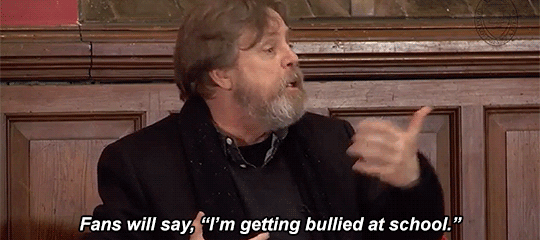
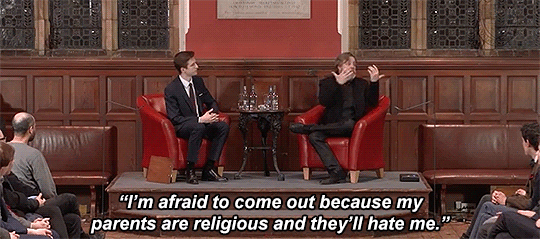
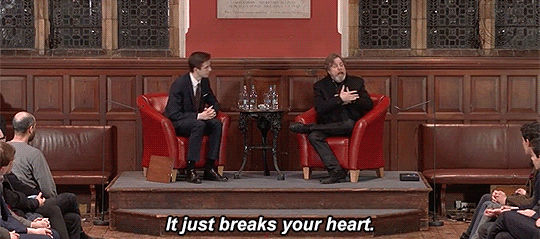
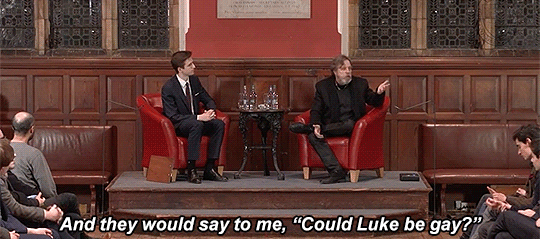
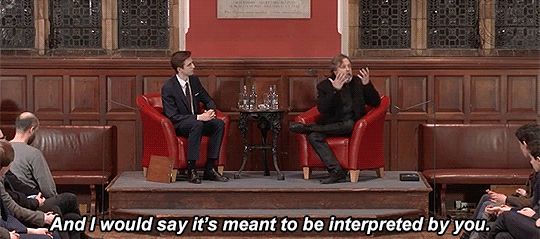

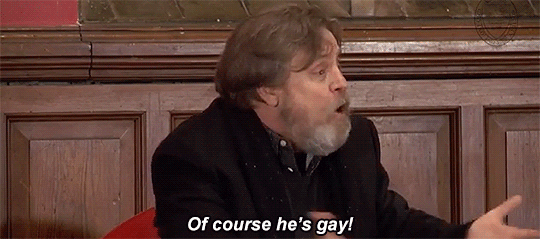
Mark Hamill speaking to fans at Oxford Union.
545K notes
·
View notes
Text
I
“Mrs. Hudson next door has a detective!” - Mrs. Turner to John Watson, who’s house sitting while Daniel and Toby are off on their honeymoon.

4K notes
·
View notes
Text
So, funny story. I’m building a character for my upcoming pathfinder game and name her Jacqueline Lopez. I start talking to my DM about my ideas of her, and one by one the ideas start falling into place. She’s a Gunslinger, but her abilities are because of the Patron, the Jackelope. She goes by Jackelope while “on mission”, and sometimes wears a Jackelope mask to protect identity. I send the mask image to my DM and he gets SOO excited. Because he remembers this post, as soon as he sees the mask. And bit by bit, even more of my character and her backstory get fleshed out. Mistaken Identity as a Drawback? Sign me up!
Did I mention @thatboomerkid is my DM? Yeah. It’s gonna be awesome! Can’t wait!!
Jackie Ipanema, Nimble Spirit of the Umbral Leaves
Jackie Ipanema, Nimble Spirit of the Umbral Leaves, the Dark Soft Breeze Extinguishing All Candles — (CR 9); unique Lawful Evil medium outsider (evil, extraplanar, kyton, lawful); evangelist kyton Aerokineticist 6 / Unchained Rogue (Rake) 1; Burn 3 or higher
You know the song. It’s played in elevators.
For special use with the Eve of Dreams & the AWAKE setting; brought to you absolutely free to play, to test & to share, as always, by the fine folks of my Patreon.
Init: +11; Senses: Perception +23, 60 ft. darkvision; Wind Sight (see below)
AC: 26, touch 18, flat-footed 19 (+4 armor, +7 Dexterity, +1 deflection, +1 natural); all ranged attacks made with physical weapons suffer a 30% miss chance against Jackie Ipanema, except for attacks from massive weapons such as a ballista. This ability has no effect on ray attacks unless Jackie Ipanema has accepted a point of Burn in the last round; in that case, non-physical attacks such as rays are also affected.
NOTE: Jackie Ipanema gains an additional +7 deflection bonus to AC against all firearm and ranged attacks if his bullet shield is activated; see Spell-Like Abilities, below

image from here
Hit Points: 171 (8d10+48 + 7d8+36); 21+ points of nonlethal damage (gains 7 points of nonlethal damage per point of Burn accepted; can accept a max of 9 Burn); Regeneration 2 (good weapons and spells, silver weapons)
Fort +18, Ref +21 (Evasion), Will +6
Damage Reduction 5/silver or good; Immune cold; Spell Resistance 17; Fortification 15% or higher; +5% Fortification per point of Burn over 3 (45% max)
Speed: 40 ft.; Jackie Ipanema is always considered to have a running start when jumping; he adds his kineticist level (+6) as a bonus on all Acrobatics checks to jump, jumps twice as far – or as high – as the results of his check indicate, and may accept 1 point of Burn when jumping to double the distance again (to a total of four times as far).
Melee: Joyful Dance (+1 glamered cold iron spiked chain) +21/+16/+11 (2d4+5); 10 ft. reach
– or Power Attack Joyful Dance (+1 glamered cold iron spiked chain) +17/+12/+7 (2d4+17); 10 ft. reach
– or Happy Melody (+1 short sword) +20/+15/+10 (1d6+4), 17-20 crit
– or Power Attack Happy Melody (+1 keen short sword) +16/+11/+6 (1d6+12), 17-20 crit
NOTE: While he is wielding the Happy Melody, Jackie Ipanema may freely use one of his additional masterwork short swords in his off-hand while making a full attack; if he chooses to do so, he suffers a -2 penalty on all attacks with the Happy Melody and gains a single additional attack at +18 with his off-hand blade (+14 if using Power Attack), which deals 1d6+1 damage (1d6+5 if using Power Attack), often enough to kill or severely injure the average person.
Ranged: Air Blast +21 (3d6+13); 0 base Burn cost, 30 ft. range
– or Deadly Aim Air Blast +17 (3d6+21); 0 base Burn cost, 30 ft. range
Sneak Attack: +1d6, see Bravado’s Blade below

– or Torrent Form Infusion (30 ft. line, base Burn cost 2); deals ½ normal Air Blast damage to all creatures in the area, Reflex save DC 20 for half
Metakinesis: by accepting 1 additional point of Burn as a free action while using any blast, Jackie Ipanema can empower his kinetic blast as if using the Empower Spell feat.
In addition, Jackie Ipanema may use the Extended Range Form Infusion by increasing the Burn cost of his ranged blast by 1; if he does so, he can strike any target within 120 feet.
BURN SPECIAL: Whenever Jackie Ipanema accepts a point of Burn – including by use of the Internal Buffer class feature – or negates a point of Burn via the Gather Power class ability, he automatically attempts a bull rush combat maneuver check with a +3 bonus against all creatures within 30 ft. He also adds his current Burn total to this roll.
This effect can only push a creature back by a maximum of 10 feet.
Neither kytons nor his fellow worshipers of Zon-Kuthon can be pushed in this way.
Keep reading
37 notes
·
View notes
Photo

Texts From Superheroes
Facebook | Twitter | Patreon
1K notes
·
View notes
Photo

Researchers have used Easter Island Moai replicas to show how they might have been “walked” to where they are displayed.
VIDEO
822K notes
·
View notes
Text
To whomsoever it may regard,
Having read this, I fear need of clarity. To begin, in the immortal words of Zangief, “Just because you are badguy does not mean you are bad guy.” Ye, whilst “bad guys” may be the ones more prone to betrayal, it is “good guys” that more often face a moral dilemma. Do not mistake me for advising having Javier’s player roll loyalty to the law, or Inspector Hercule Poirot, for that matter, nor even Samwise’s loyalty to the quest when he declared, “I can’t carry it for you, but I can carry you.” Lest this be seen as inapplicable to “good” campaigns, these thoughts are hereby declared as addendum.
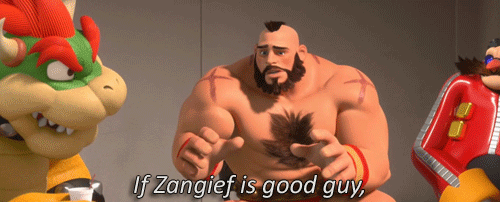

Secondly, as a player in a large party, the note regarding updating loyalty every session leaves a ponderment. May I only update one loyalty, or each loyalty?

Second-secondly, this bear does not have chainsaw arms, and perhaps explains their sadness... or origin story(?)
Lastly, you use the term “species”, but it could also be race, heritage, birth planet, guild, clan, All hail the God-Pharoah May his return come quickly, or school of magic. Whatever the setting calls for. Speak the same uncommon language? Favoritism gained!
An Optimally-Evil Party -- Pathfinder Loyalty Options
An Optimally-Evil Party: Pathfinder Loyalty Options
“I against my brother, my brothers and I against our tribe, my tribe and I against all strangers.”
– ancient Bedouin saying
So: you’ve decided to run a ‘morally-ambiguous’ party.
NICE.

Yes, you’re gonna have villains and anti-heroes, demon-summoners and dark knights; you’ll have assassins and scoundrels, Sith-Lords and Death-Eaters and pirates and suave playboys; you’ll have cackling madmen and clever bastards, dragon-queens and Bond-girls, rock-stars and outlaws and immortal-blooded sexy necromancer-ninjas all going on wicked-cool adventures together.
AWESOME.
They’ll be memorable and interesting, no doubt.
They’ll have mind-blowing, humanizing redeeming qualities; they’ll have failures and foibles and fears; they’ll have taboos and tricks, turning-points and traumas and tragic back-stories and – above-all! – crowning moments of awesome.
They’ll have multi-dimensional, complex opponents and adversaries including everything from goody-two-shoes know-nothings to well-intentioned extremists, from fellow villains too dumb or dangerous to let live to … well, to their own dark patrons, maybe.
They’ll explore intense, fascinating themes, both comedic and dramatic, together … and everyone – you & your players alike – will walk away from the table thinking “wow, stories about baddies can be awesome.”

Maybe they’ll all serve Asmodeus or a dark empire together; maybe they’ll be loyal to a smaller-name evil like Achaekek or Zon-Kuthon; maybe they’ll unite behind a hungry & under-served deity like Orcus, Tiamat or Mephistopheles; maybe they’ll hoist the black flag & raise high the blood-stained banner for a super-obscure deity like Yhidothrus or Stygidvod or the Green Mother.
Maybe they’ll make their own divinity.
Heck, maybe they’ll be a rag-tag & motley pack that includes an Antipaladin of Abraxas, a Weapon-Sworn Eldritch Scion/Staff Magus of Socothbenoth, a card-throwing bomber dedicated to chaos herself, a kineticist of Yamatsumi and a Roar of Rovagug.
Or something weirder still.
Maybe they’ll surprise you. You should definitely let them.
Maybe they’ll build a dark kingdom and rule over cowering, foolish peasants together with an iron fist; maybe their wandering, world-tour spiral of mass destruction will bring new meaning to the term “murder hobos.”
Only one way to find out.
Maybe they’ll bring down a whole world and remake it in their own image.
They’ll definitely shake things up.
Because they’ll be a party.
Keep reading
291 notes
·
View notes
